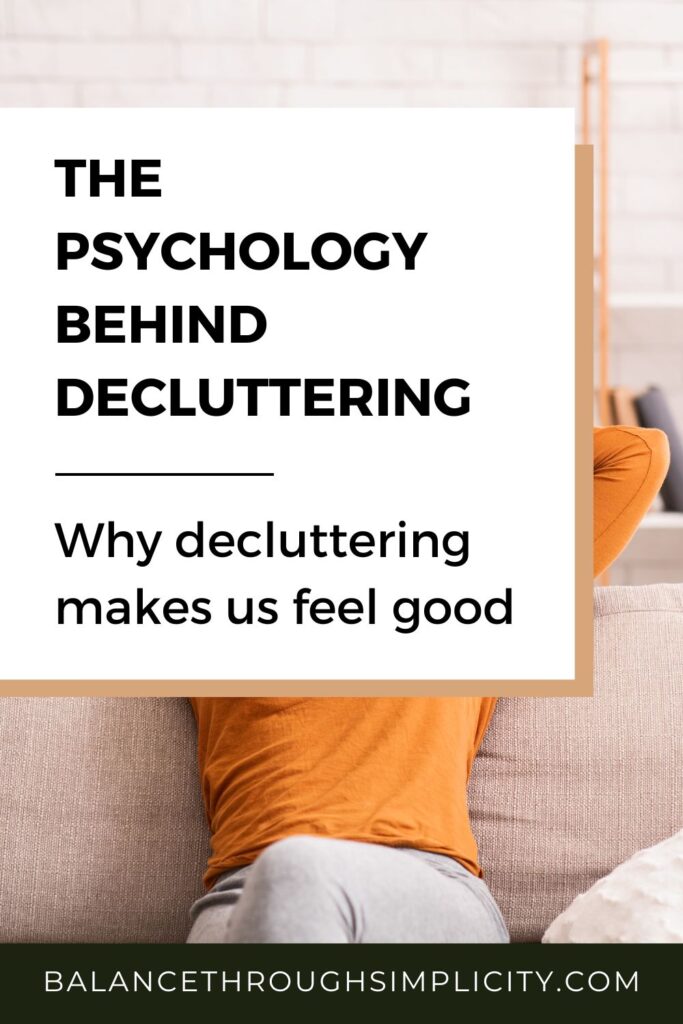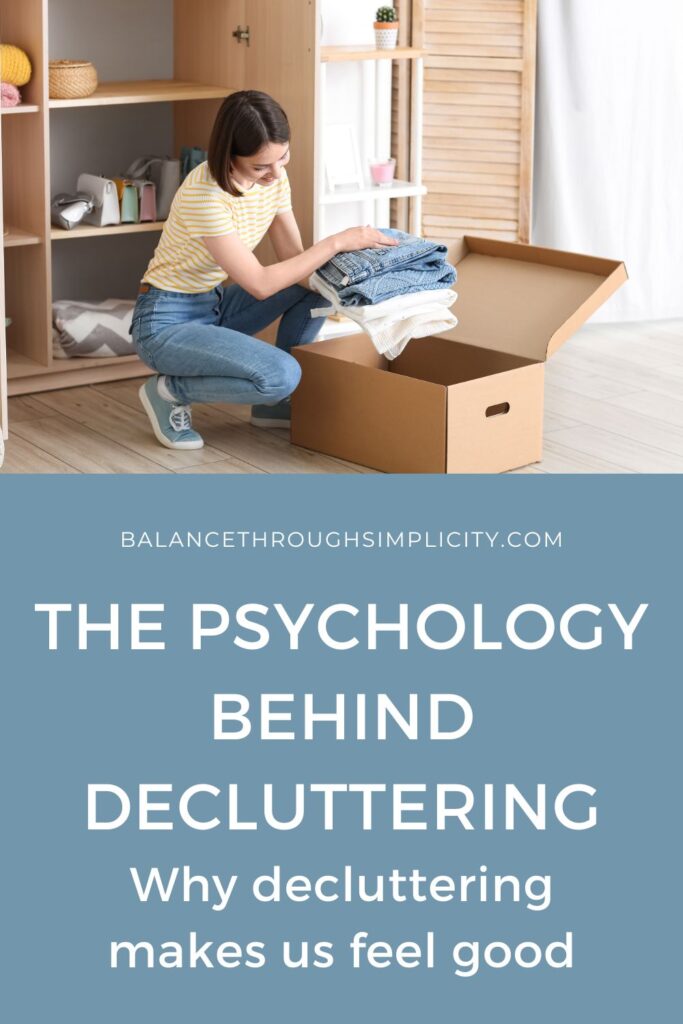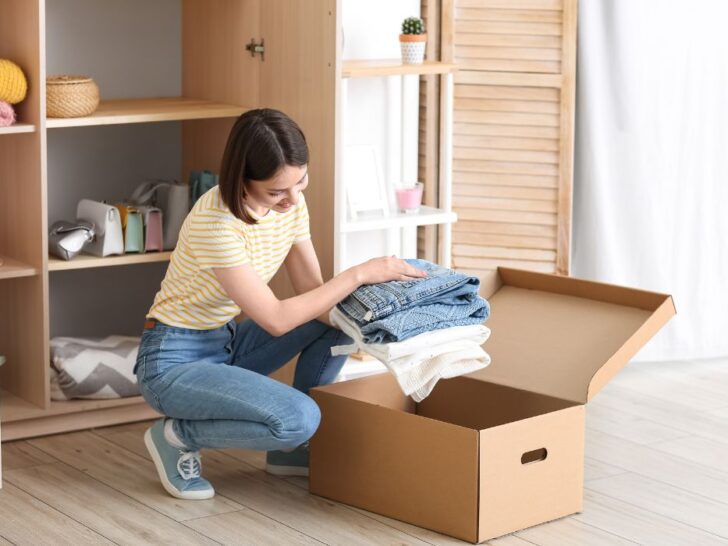THE PSYCHOLOGY BEHIND DECLUTTERING: WHY DOES IT MAKE YOU FEEL GOOD?
This guest article from Evelyn Long describes the impact that clutter has on our body and brain. We explore more about the psychology behind decluttering and why clearing clutter make us feel good!
WHY DOES DECLUTTERING MAKE US FEEL GOOD?
Sources of stress come from several things, such as relationships or problems at work. For many of us, clutter around the home or unkempt kids’ toys could instantly incite distress.
If you’re someone who goes for a run or a massage when your stress levels increase, try cleaning to release your tension. Learn the psychology behind decluttering and why it makes you feel good.
ADVERSE PSYCHOLOGICAL EFFECTS OF CLUTTER
A chaotic and cluttered environment has several negative effects on your psychology.
1. Contributes to Depression
Depression is a condition that makes you feel persistent sadness, stress and anxiety. Expectedly, a cluttered environment is one of the factors increasing the risk of this mental health disorder.
Clutter substantially affects your mood and self-esteem. UCLA’s Center on Everyday Lives and Families (CELF) examined 32 California families and their possessions. It found a link between high cortisol or stress hormone levels and owning too many things. Stress can be a significant contributor to depression.
2. Decreases Your Focus
The things around you occupy mental space and affect how you behave, respond and tackle daily tasks. You can’t entirely focus on your responsibilities if you have dirty dishes in the sink or foul kitchen trash you haven’t thrown out. These unfinished tasks stick in the back of your mind, stealing your focus away from the meaningful things you need to do.
Several studies have proved that your physical environment can influence the state of your mental and emotional health, changing your motivation to act and make decisions. For instance, an open, inviting space will encourage visitors to stay, while a dingy or messy space does the opposite.
3. Ruins Your Productivity
You’re less productive when you can’t direct your focus on essential tasks because of clutter. For example, you won’t be able to finish an important presentation if your mind wanders to the trash you didn’t take out last night.
Another way clutter kills your productivity and wastes your time is by making it harder to locate things you need. According to the National Association of Professional Organizers (NAPO), people spend more than 8,700 hours or one year to find misplaced or lost items because things are disorderly.
4. Lowers Your Happiness
Stress from unorganised stuff weighs on your happiness. Just looking at the scattered clothes and shoes on the floor or the thousand unopened emails in your inbox can induce tension in a snap.
A study on emerging adults aged 20 to 30 found that cluttered living spaces increased clinical distress among participants. Moreover, a person with excessive, unnecessary stuff that contributes to home space clutter may exhibit the same behaviour as someone with a hoarding disorder — a condition where you find it hard to throw away material things and believe you need them. A disorganised home triggers negative emotions that lower your happiness.
5. Increases the Risk of Accidents at Home
Lastly, cluttered clothes and toys can limit mobility and lead to serious accidents and expensive hospital admissions.
Scattered things on the walkways can cause trips and falls for older family members. An unclean kitchen or room encourages dirt, mould, mildew and bugs to thrive, imposing hazards on your family’s health.

POSITIVE PSYCHOLOGICAL BENEFITS OF DECLUTTERING
If you feel the negative consequences of clutter, these positive merits of decluttering will inspire you to add this practice to your daily routine.
1. Improves Your Physical Health
Scrubbing the toilet, dusting surfaces, lifting boxes or cleaning your garden increases your heart rate. It’s a good cardio exercise that will make you sweat, and getting more physical activity can also improve your mood.
While decluttering probably can’t compare with the effects of going to the gym, the reward for your labours is a cleaner house. If you do heavier tasks like scrubbing or washing windows, you easily burn calories, which is comparable to an hour of weightlifting at the gym.
2. Makes You an Environmentally Responsible Person
Should you donate your and your kids’ old clothes? Many of us are guilty of having an overwhelming amount of garments that contribute to mess and out-of-control storage problems. Over 16.9 million tons of textiles produced end up in landfills, sparking environmental concerns.
You can protect the environment by minimising the quantity of your clothes and giving away used ones to those in need. Environmentally-inspired actions set an excellent example for your kids or other family members and empower them to do the same.
3. Helps You Gain Control of Your Environment
Organising gives you a sense of control over your surroundings and being creative in disposing of things you no longer use. For instance, you can sell books or sew old clothes to create a new dress instead of buying.
Deciding how to arrange your things and what to do with them can feel liberating and bring back a sense of freedom into your life.
4. Improves Your Mood
Arguably, a neat space can clear your mind and make you feel energised. One study on 51 university students revealed washing dishes — as a contemplative practice — enhanced their mindfulness level and positive mood, including feeling inspired. It also reduced nervousness.
Going home to a clean and dirt-free living space after a stressful day can be the best feeling in the world. It can uplift your mood and make you more optimistic.
5. Increases Your Focus
If a dirty environment dials down your focus, the opposite is also true. A tidy workspace can make you feel motivated and inspired. For instance, a clean kitchen and well-arranged condiments can help you focus on cooking and finish it quickly.
Clutter can overcrowd your brain and overstimulate your senses, causing unnecessary stress. When your area is maintained, it’s easier to direct your attention to the task in front of you.
6. Decluttering Is a Form of Self-Care
Cleaning can sometimes be challenging, especially if you’re deluged with daily responsibilities, giving you no time and energy to tackle clutter. An effective way to deal with the often overwhelming task of cleaning is to start small until you make progress.
Decluttering has the same benefits to your physical, mental and emotional health as your self-care routine. Looking at a tidy space makes you feel relaxed and happy. You owe it to your well-being to clean your home.

SHARE YOUR THOUGHTS
I hope you enjoyed this article on the psychology of decluttering and why clearing your clutter makes you feel good. There are many benefits to decluttering your home and life!
What have you found to be the greatest benefit to decluttering your own home? Did you find it hard to declutter and, if so, what did you do to overcome the challenges? What would you say to someone who is uncertain about or finding decluttering tough?
I’d love to hear from you so please leave a comment below!
Here are some articles and resources, building on the psychology behind decluttering and some of the topics we’ve covered, which you might find helpful in different ways:
- 11 Ways to Detox Your Home for Improved Health and Wellbeing – Decluttering your home is not the only way to create a home that’s better for your physical and mental health and wellbeing. In this article we explore 11 ways to detox your home.
- The Benefits of a Capsule Wardrobe for Reducing Waste – Building a smaller, more minimalist wardrobe has many benefits. If you would like to explore a capsule wardrobe for yourself, in this article we look at some of the benefits of a capsule wardrobe for reducing waste in the environment.
- How Minimalism Helps Chronic Illness and Poor Health – The minimalist lifestyle helps simplify our lives in many ways. In this article I explore some personal ideas around the benefits of minimalism if you’re suffering from poor health and how minimalism helps chronic illness sufferers and their loved ones and carers.
- How to Help Kids and Teenagers Declutter and Keep Their Room Clean and Tidy – For those of you with older kids and teenagers, you may be familiar with the struggle to keep them motivated. This is even more difficult when you’re trying to motivate and encourage them to help around the home and clear up after themselves! If this resonates with you, here are some tips on how to help kids and teenagers declutter and keep their room clean and tidy.
- The Connection Between Mindfulness and Decluttering – Decluttering a home can be difficult, especially if you have years’ worth of memories stored up. However, practicing mindfulness while going through each room is a great way to decrease stress and help you finish the chore faster. In this article we explore the connection between mindfulness and decluttering.
ABOUT THE AUTHOR
Evelyn Long is the editor-in-chief of Renovated, an online magazine for interior design, home organisation, and cleaning where she writes about these topics. She has also written for other publishers like Matchedness and urdesign Magazine.
GET YOUR FREE DECLUTTER CHECKLIST
Sometimes we want to clear our clutter but find it difficult deciding what, where or how to start decluttering. If you love a checklist and being able to tick things off and track your progress, you might enjoy following along with this handy Declutter Checklist with 100 things to get rid of today!
Pop your details in the box below so I know where to send your copy!

